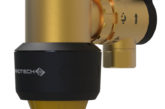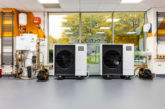
Smart home company, Hive, and heat pump manufacturer, Daikin, have announced the first step in what they describe as ‘a long-term collaboration’ to make net zero easier by helping customers control their heat pump through the Hive app.
The collaboration will see Daikin Altherma 3 heat pumps integrated with Hive energy management technology, a move designed to provide customers with greater visibility and control of their heating system. This includes allowing homeowners to personalise heating schedules, track spending and set budgets, whilst also optimising their heat pump for use when electricity is cheaper and greener because there is low demand on the grid.
Both businesses will be trialing the integration later this year and have plans to roll out the product offering widely once the trial is complete.
Gail Parker, Low Carbon Homes Director – Heat Pumps at Hive, said: “Domestic heating is one of the largest emitters of carbon in the UK and will require collaboration to address this challenge. As we integrate Daikin heat pumps with our market leading Hive technology, we are making electric heating affordable and simple by giving them the visibility they need to control their heat pump and energy usage.
“As we work towards heat pumps joining the Hive ecosystem of well-loved products, we’re providing customers with a simple way to see and manage all their devices in one easy to use app.”
Iain Bevan, New Business Director – Residential commented: “If the UK is going to hit its legally binding commitment to achieve net zero by 2050, we have to decarbonize domestic space and water heating. Combining a smart controller, like Hive, with a low carbon heat pump not only gives people more control, it can also help them get the perfect temperature and save them even more money at the same time.
“Daikin is excited to be working with Hive to fully integrate their smart controller technology with our market leading heat pump technology. This collaboration could help tens of thousands of people decarbonize their domestic heating, reducing their carbon footprint and help address climate change.”













